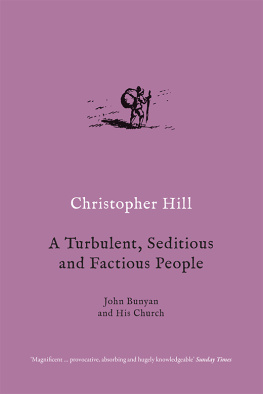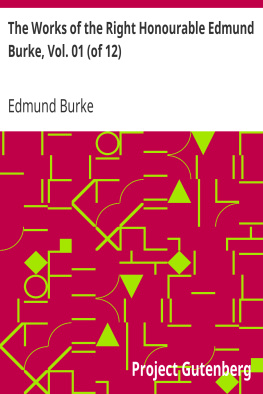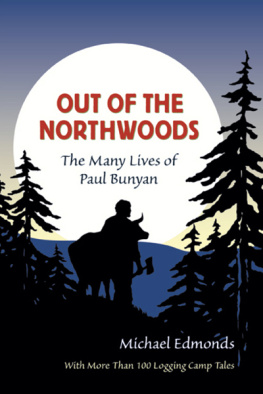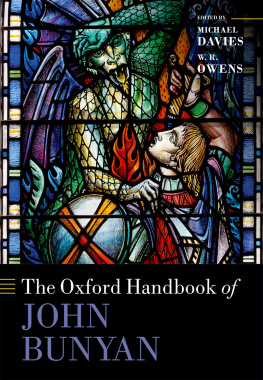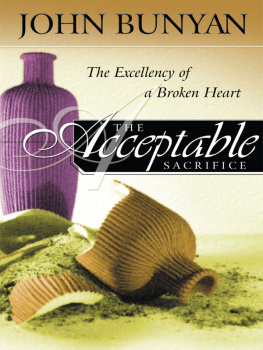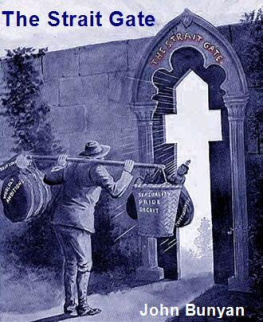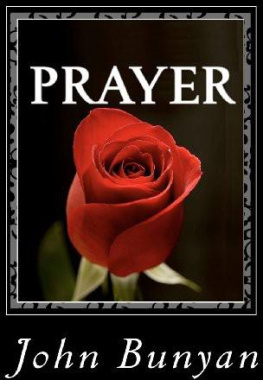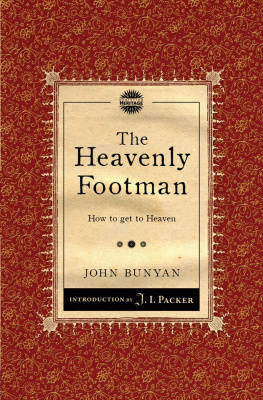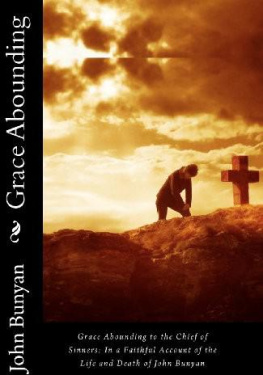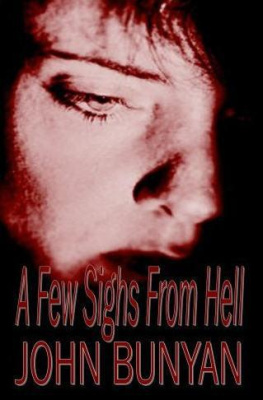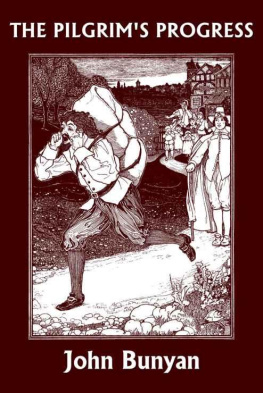Edmund Venables - John Bunyan
Here you can read online Edmund Venables - John Bunyan full text of the book (entire story) in english for free. Download pdf and epub, get meaning, cover and reviews about this ebook. year: 2012, publisher: Andrews UK, genre: Detective and thriller. Description of the work, (preface) as well as reviews are available. Best literature library LitArk.com created for fans of good reading and offers a wide selection of genres:
Romance novel
Science fiction
Adventure
Detective
Science
History
Home and family
Prose
Art
Politics
Computer
Non-fiction
Religion
Business
Children
Humor
Choose a favorite category and find really read worthwhile books. Enjoy immersion in the world of imagination, feel the emotions of the characters or learn something new for yourself, make an fascinating discovery.

- Book:John Bunyan
- Author:
- Publisher:Andrews UK
- Genre:
- Year:2012
- Rating:5 / 5
- Favourites:Add to favourites
- Your mark:
- 100
- 1
- 2
- 3
- 4
- 5
John Bunyan: summary, description and annotation
We offer to read an annotation, description, summary or preface (depends on what the author of the book "John Bunyan" wrote himself). If you haven't found the necessary information about the book — write in the comments, we will try to find it.
A fascinating biography of John Bunyan, the Christian writer and preacher famous for his work The Pilgrims Progress, written by the historian and literary scholar Edmund Venables.
John Bunyan — read online for free the complete book (whole text) full work
Below is the text of the book, divided by pages. System saving the place of the last page read, allows you to conveniently read the book "John Bunyan" online for free, without having to search again every time where you left off. Put a bookmark, and you can go to the page where you finished reading at any time.
Font size:
Interval:
Bookmark:
THE LIFE OF JOHN BUNYAN
by Edmund Venables, M.A.
This edited version, including layout, typography, additions to text, cover artwork and other unique factors is copyright 2012 Andrews UK Limited
This book is sold subject to the condition that it shall not, by way of trade or otherwise, be lent, resold, hired out or otherwise circulated without the publishers prior written consent in any form of binding or cover other than that in which it is published, and without a similar condition being imposed on the subsequent purchaser.
CHAPTER I.
John Bunyan, the author of the book which has probably passed through more editions, had a greater number of readers, and been translated into more languages than any other book in the English tongue, was born in the parish of Elstow, in Bedfordshire, in the latter part of the year 1628, and was baptized in the parish church of the village on the last day of November of that year.
The year of John Bunyans birth was a momentous one both for the nation and for the Church of England. Charles I., by the extorted assent to the Petition of Right, had begun reluctantly to strip himself of the irresponsible authority he had claimed, and had taken the first step in the struggle between King and Parliament which ended in the House of Commons seating itself in the place of the Sovereign. Wentworth (better known as Lord Strafford) had finally left the Commons, baffled in his nobly-conceived but vain hope of reconciling the monarch and his people, and having accepted a peerage and the promise of the Presidency of the Council of the North, was foreshadowing his policy of Thorough, which was destined to bring both his own head and that of his weak master to the block. The Remonstrance of Parliament against the toleration of Roman Catholics and the growth of Arminianism, had been presented to the indignant king, who, wilfully blinded, had replied to it by the promotion to high and lucrative posts in the Church of the very men against whom it was chiefly directed. The most outrageous upholders of the royal prerogative and the irresponsible power of the sovereign, Montagu and Mainwaring, had been presented, the one to the see of Chichester, the other - the impeached and condemned of the Commons - to the rich living Montagus consecration had vacated. Montaigne, the licenser of Mainwarings incriminated sermon, was raised to the Archbishopric of York, while Neile and Laud, who were openly named in the Remonstrance as the troublers of the English Israel, were rewarded respectively with the rich see of Durham and the important and deeply-dyed Puritan diocese of London. Charles was steadily sowing the wind, and destined to reap the whirlwind which was to sweep him from his throne, and involve the monarchy and the Church in the same overthrow. Three months before Bunyans birth Buckingham, on the eve of his departure for the beleaguered and famine-stricken city of Rochelle, sanguinely hoping to conclude a peace with the French king beneath its walls, had been struck down by the knife of a fanatic, to the undisguised joy of the majority of the nation, bequeathing a legacy of failure and disgrace in the fall of the Protestant stronghold on which the eyes of Europe had been so long anxiously fixed.
The year was closing gloomily, with ominous forecasts of the coming hurricane, when the babe who was destined to leave so imperishable a name in English literature, first saw the light in an humble cottage in an obscure Bedfordshire village. His father, Thomas Bunyan, though styling himself in his will by the more dignified title of brazier, was more properly what is known as a tinker; a mender of pots and kettles, according to Bunyans contemporary biographer, Charles Doe. He was not, however, a mere tramp or vagrant, as travelling tinkers were and usually are still, much less a disreputable sot, a counterpart of Shakespeares Christopher Sly, but a man with a recognized calling, having a settled home and an acknowledged position in the village community of Elstow. The family was of long standing there, but had for some generations been going down in the world. Bunyans grandfather, Thomas Bunyan, as we learn from his still extant will, carried on the occupation of a petty chapman, or small retail dealer, in his own freehold cottage, which he bequeathed, with its appurtenances, to his second wife, Ann, to descend, after her death, to her stepson, his namesake, Thomas, and her own son Edward, in equal shares. This cottage, which was probably John Bunyans birthplace, persistent tradition, confirmed by the testimony of local names, warrants us in placing near the hamlet of Harrowden, a mile to the east of the village of Elstow, at a place long called Bunyans End, where two fields are still called by the name of Bunyans and Further Bunyans. This small freehold appears to have been all that remained, at the death of John Bunyans grandfather, of a property once considerable enough to have given the name of its possessor to the whole locality.
The family of Buingnon, Bunyun, Buniun, Boynon, Bonyon, or Binyan (the name is found spelt in no fewer than thirty-four different ways, of which the now-established form, Bunyan, is almost the least frequent) is one that had established itself in Bedfordshire from very early times. The first place in connection with which the name appears is Pulloxhill, about nine miles from Elstow. In 1199, the year of King Johns accession, the Bunyans had approached still nearer to that parish. One William Bunion held land at Wilstead, not more than a mile off. In 1327, the first year of Edward III., one of the same name, probably his descendant, William Boynon, is found actually living at Harrowden, close to the spot which popular tradition names as John Bunyans birthplace, and was the owner of property there. We have no further notices of the Bunyans of Elstow till the sixteenth century. We then find them greatly fallen. Their ancestral property seems little by little to have passed into other hands, until in 1542 nothing was left but a messuage and pightell {1} with the appurtenances, and nine acres of land. This small residue other entries on the Court Rolls show to have been still further diminished by sale. The field already referred to, known as Bonyons End, was sold by Thomas Bonyon, of Elstow, labourer, son of William Bonyon, the said Thomas and his wife being the keepers of a small roadside inn, at which their overcharges for their home-baked bread and home-brewed beer were continually bringing them into trouble with the petty local courts of the day. Thomas Bunyan, John Bunyans father, was born in the last days of Elizabeth, and was baptized February 24, 1603, exactly a month before the great queen passed away. The mother of the immortal Dreamer was one Margaret Bentley, who, like her husband, was a native of Elstow and only a few months his junior. The details of her mothers will, which is still extant, drawn up by the vicar of Elstow, prove that, like her husband, she did not, in the words of Bunyans latest and most complete biographer, the Rev. Dr. Brown, come of the very squalid poor, but of people who, though humble in station, were yet decent and worthy in their ways. John Bunyans mother was his fathers second wife. The Bunyans were given to marrying early, and speedily consoled themselves on the loss of one wife with the companionship of a successor. Bunyans grandmother cannot have died before February 24, 1603, the date of his fathers baptism. But before the year was out his grandfather had married again. His father, too, had not completed his twentieth year when he married his first wife, Anne Pinney, January 10, 1623. She died in 1627, apparently without any surviving children, and before the year was half-way through, on the 23rd of the following May, he was married a second time to Margaret Bentley. At the end of seventeen years Thomas Bunyan was again left a widower, and within two months, with grossly indecent haste, he filled the vacant place with a third wife. Bunyan himself cannot have been much more than twenty when he married. We have no particulars of the death of his first wife. But he had been married two years to his noble-minded second wife at the time of the assizes in 1661, and the ages of his children by his first wife would indicate that no long interval elapsed between his being left a widower and his second marriage.
Next pageFont size:
Interval:
Bookmark:
Similar books «John Bunyan»
Look at similar books to John Bunyan. We have selected literature similar in name and meaning in the hope of providing readers with more options to find new, interesting, not yet read works.
Discussion, reviews of the book John Bunyan and just readers' own opinions. Leave your comments, write what you think about the work, its meaning or the main characters. Specify what exactly you liked and what you didn't like, and why you think so.

